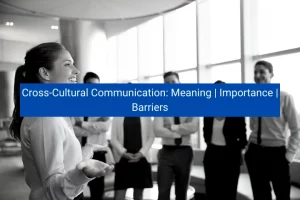Negotiation is a two-way conversation between two parties to resolve disagreements or issues in a way that is acceptable to both parties. In most cases, it's a give-and-take situation. Negotiation in communication occurs when each party makes a concession in order to resolve a problem in the best interests of all parties involved. Negotiations can take place between managers, departments, co-workers, or team members and the manager in the workplace. You can negotiate with your interviewer or HR manager with a promise of employment before you start working.

In this post, we'll look at how your negotiation skills help you in your communication.
What are Negotiation Skills?
Negotiation skills are factors that enable two or more parties to reach an agreement with a sound solution. You may need to use your job interview skills in a variety of situations, including:
- After a promotion, negotiating a raise with the HR manager
- Working with your team leader or manager to set a project deadline
- Talk to your boss about taking a few days off for a family vacation.
- Dealing with a potential customer and negotiating contract terms
Lack of bargaining skills has a negative impact on a company's bottom line and can jeopardize client relationships. Negotiation skills are soft skills that are necessary for becoming a negotiator and resolving workplace disputes.
Must Read: 10 Ways to Improve Your Client Relationships
This skill set, however, is dependent on the work environment, the parties engaged, and the ultimate goal. When one party is willing to negotiate a compromise, the other party is often apprehensive. Negotiation in communication becomes difficult as a result, and you are likely to meet similar circumstances at work. That is why you must hone your negotiating abilities.
How do Negotiation Skills Help in Your Communication?
The majority of negotiators are underprepared. How you use your voice is an area that is rarely discussed in a negotiation. Your voice sends a message to the other party all the time. Your message will generally be an accurate reflection of your feelings at the time without any deliberate effort on your part. Sharing these feelings with the other party may or may not be beneficial to you, thus it is far too dangerous to do so by accident.
Your voice can account for up to 38% of your message (or 75% if they can't see you). The communication in negotiation, the tone of your voice affects how credible and confident you appear to the other party. These two factors are likely to have a big impact on your chances of getting the greatest offer, so pay attention to them. This is something you may do both before and during the negotiation.
Before
Consider the difficult situations you're going to face. Consider the worst-case situation (say they catch you by surprise with a personal attack). How do you think you'd react? As you enter the negotiation in communication, use slow, deep breathing to calm yourself down, and be prepared to repeat this as a settling exercise if necessary.
During
Take it easy. Negotiators who are eager and worried speak too quickly. Negotiators that are confident speak carefully and methodically. They are paying close attention to the other party's reaction to whatever they say. They take a few long pauses and they are at ease in silence, thus they take their time while asking or answering questions.
Must Read: Can Meditation be Beneficial for you in the Workplace?
Cross-Culture
The distinctions in how we use language become increasingly apparent and essential as we communicate between cultures. This is because negotiation is built on a succession of agreements that are generally signaled by a 'yes' or a 'no' (two words that feature in the titles of approximately half of all books on negotiation). The problem is that these words are used differently in different cultures. These words are freely used in Low-Context Cultures (very generally, Western Cultures) to convey agreement or rejection. Face Cultures (where saving face' is strongly prized) are significantly less likely to be confrontational with their communication than High-Context Cultures. They are significantly less likely to say 'no,' and 'yes,' rather than 'I agree,' which could indicate 'I understand.'
Negotiations between Non-Negotiating Cultures (mostly Western) and Negotiating Cultures are also common (for example, East Asia and the Middle East). The former report grew quite frustrated during such conversations because the person from a Negotiating Culture "would not take no for an answer!" Each time they met once they idea that they had reached a settlement, someone wanted the same settlement. Of course, it wasn't their 'fault,' but rather their culture.
Your use of voice, particularly intonation, can lend strong significance to such interactions. Consider the following two examples:
Must Read: Steps to Make a Great Impression at the First Day of the Job
- Use a strong upward accent in your voice when asking for agreement. This makes you appear less intimidating and makes people more likely to reply. (You might not get a 'yes,' but you'll almost certainly get a nod.)
- Say 'no' with a strong downward accent as you say it. Any sentence delivered with a decreasing inflection will be seen as more authoritative and conclusive by the listener.
People are far more likely to trust how you say something than what you say, so consider, "What message do I want to send here?" You can do this by becoming more effective in your conversations by focusing on areas of temptation to talk, relax, and voice.
For Human Resource, Payroll and many more HR Services, visit our website https://lingueeglobal.com/


